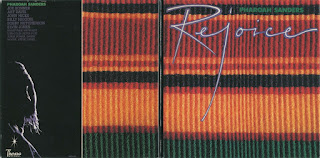The great great Ferrell just finished the second of a two-night stand here. So, in honor and awe, here's a couple of his finest mid-period sides on the Theresa label. Rejoice is of course a bonafide barabara classic – just look and marvel at the outstanding line-up of musicians he has with him here – and without question cause for outright exultation.
As for Journey to the One, it's a bit of a cosmic cocktail of textures – from spiritual-jazz anthems and all-out trademark Pharoa-nics to ballads, and using koto, sitar, synths and more – but there are plenty of special moments here, not least the stately magnificent Bedria that closes out side 4. One of my favorites, in fact...
dusty sez (on Rejoice):
Fantastic 80s work from Pharoah Sanders – with a vibe that's a perfect extension of his classic work for the Impulse label! The album has Pharoah working with an amazing group – Bobby Hutcherson on vibes, John Hicks and Joe Bonner on piano, Art Davis on bass, and either Elvin Jones or Billy Higgins on drums. The sound is remarkably fresh – soaring and spiritual, but also more focused than in earlier years, with a great amount of soulful warmth. And although extra elements are added – like vocals, vibes, and added percussion – Pharoah's solos still dominate the whole album beautifully.
amg (Scott Yanow) sez (on Journey):
…all ten of Pharoah Sanders's performances from the sessions. As usual, Sanders shifts between spiritual peace and violent outbursts in his tenor solos. The backup group changes from track to track but often includes pianist John Hicks, bassist Ray Drummond and drummer Idris Muhammad. Sanders really recalls his former boss John Coltrane on "After the Rain" (taken as a duet with pianist Joe Bonner) and a romantic "Easy to Remember"; other highpoints include "You've Got to Have Freedom" (which has Bobby McFerrin as one of the background singers) and the exotic "Kazuko" on which Sanders is accompanied by koto, harmonium and wind chimes.





